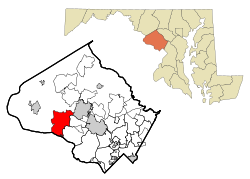Darnestown, Maryland
| Darnestown, Maryland | |
|---|---|
| Census-designated place | |
 Location of Darnestown, Maryland |
|
| Coordinates: 39°6′5″N 77°16′52″W / 39.10139°N 77.28111°WCoordinates: 39°6′5″N 77°16′52″W / 39.10139°N 77.28111°W | |
| Country | |
| State |
|
| County |
|
| Area | |
| • Total | 17.7 sq mi (45.8 km2) |
| • Land | 16.6 sq mi (42.9 km2) |
| • Water | 1.1 sq mi (2.9 km2) |
| Elevation | 410 ft (125 m) |
| Population (2000) | |
| • Total | 6,378 |
| • Density | 384.6/sq mi (148.5/km2) |
| Time zone | Eastern (EST) (UTC-5) |
| • Summer (DST) | EDT (UTC-4) |
| ZIP codes | 20874, 20878 |
| Area code(s) | 301/240 |
| FIPS code | 24-21825 |
| GNIS feature ID | 0590068 |
Darnestown is a census-designated place and an unincorporated area in Montgomery County, Maryland, United States.
As an unincorporated area, Darnestown's boundaries are not officially defined. Darnestown is, however, recognized by the United States Census Bureau as a census-designated place, and by the United States Geological Survey as a populated place located at 39°6′5″N 77°16′52″W / 39.10139°N 77.28111°W (39.101429, -77.281236).
According to the United States Census Bureau, the place has a total area of 17.7 square miles (46 km2), of which, 16.6 square miles (43 km2) of it is land and 1.1 square miles (2.8 km2) of it (6.27%) is water.
Named for William Darnes, the community was built on 2,000 acres (810 ha) of land inherited by his wife from her father Charles Gassway's 'Mount Pleasant' land grant. Originally, the town was referred to as Mount Pleasant, but the name shifted in popular parlance to Darnes and eventually Darnestown. The community was located halfway between Montgomery Court House (modern-day Rockville) and the mouth of the Monocacy River, and originally consisted of a tavern, a pair of blacksmiths, a wheelwright, a single store, and a log building which served as both a school and the home of several churches. The community's greatest economic boom was during the Civil War, when providing for the needs of the armies camped around Washington, DC provided new income. Following the war, however, Darnestown slowly deflated and eventually ceased being a commercial center, with only a few of the original buildings left standing. The area has since been absorbed by suburban development.
...
Wikipedia
